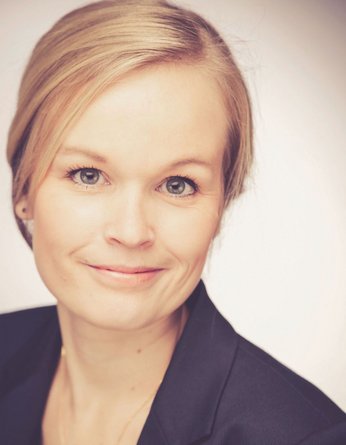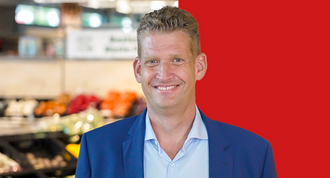
Von Köln nach Budapest: Caroline Horn wechselte im Winter 2017 als Referentin in die Personalabteilung zu PENNY nach Ungarn – heute ist sie dort Head of Human Resources.
 Caroline Horn
Da ist zum Beispiel die Sache mit den leeren Tellern bei Tisch: Wer in einem Budapester Restaurant ein Gericht verzehrt hat, muss nicht lange warten, bis eine Kellnerin oder ein Kellner den Teller abräumt. So viel Eile würde man in Deutschland als unhöflich empfinden. „In Ungarn ist der Tisch-Knigge in diesem Punkt anders. Dort gilt es als unkultiviert, vor einem leer gegessenen Teller zu sitzen“, erzählt Caroline Horn. Es sind solche Kleinigkeiten, die der 34-Jährigen immer wieder deutlich machen, dass es feine kulturelle Unterschiede zwischen beiden Ländern gibt – was sie anfangs nicht gedacht hatte. „Aber je länger ich hier bin, umso mehr wird mir das bewusst.“
Caroline Horn
Da ist zum Beispiel die Sache mit den leeren Tellern bei Tisch: Wer in einem Budapester Restaurant ein Gericht verzehrt hat, muss nicht lange warten, bis eine Kellnerin oder ein Kellner den Teller abräumt. So viel Eile würde man in Deutschland als unhöflich empfinden. „In Ungarn ist der Tisch-Knigge in diesem Punkt anders. Dort gilt es als unkultiviert, vor einem leer gegessenen Teller zu sitzen“, erzählt Caroline Horn. Es sind solche Kleinigkeiten, die der 34-Jährigen immer wieder deutlich machen, dass es feine kulturelle Unterschiede zwischen beiden Ländern gibt – was sie anfangs nicht gedacht hatte. „Aber je länger ich hier bin, umso mehr wird mir das bewusst.“
Seit Dezember 2017 ist die gebürtige Leverkusenerin für PENNY International in Ungarn, zunächst als Referentin in der Personalabteilung, seit Juni vergangenen Jahres als Personalleiterin, verantwortlich für vier Teams mit insgesamt 30 Mitarbeiterinnen und Mitarbeitern. „Unverhofft“ nennt Caroline Horn diesen letzten Karriereschritt. „Ich hatte vorher keine Managementposition mit einer so großen Verantwortung – trotzdem haben mir die Verantwortlichen bei PENNY International Vertrauen geschenkt und diese Aufgabe übertragen.“ Ihr Werdegang ist ein Beispiel dafür, welche beruflichen Optionen sich manchmal auftun, vorausgesetzt man ist offen für Veränderungen.
„Sie müssen mal rein ins Geschäft, damit Sie wissen, wie wir Geld verdienen“
Nach einem Bachelor in Sozialwissenschaften fasste Caroline Horn den Entschluss, im Personalbereich arbeiten zu wollen. Sie studiert HR Management in Hamburg und sammelt dort auch erste Berufserfahrungen. 2012 beginnt sie bei der REWE Group als Bereichstrainee und kümmerst sich dort insbesondere um den Management Campus, das Lernangebot für die Qualifizierung des oberen Managements. Nach einem halben Jahr übernimmt sie die Verantwortung für die konzeptionelle und inhaltliche Gestaltung dieses Weiterbildungsprogramms. „Das war enorm spannend, weil ich in dieser Zeit Manager meines Unternehmens aus verschiedenen Ländern kennenlernen durfte.“
Parallel zur Betreuung des Management Campus steigt Caroline Horn bei einem HR-Projekt von PENNY International ein. Themen: Recruiting sowie Learning/Development. In dieser Zeit reift der Wunsch, im Ausland zu arbeiten. Erfahrungen besitzt sie: Als Schülerin hatte sie ein Jahr in Kanada verbracht, später ein Auslandssemester in Finnland absolviert und ein Praktikum in Australien gemacht. Christoph Matschke, Vorstand der REWE International AG, bestärkt sie in ihren Plänen: „Sie müssen mal raus aus dem Elfenbeinturm, rein ins Geschäft, damit Sie wissen, wie wir Geld verdienen.“ Als die Anfrage von PENNY Ungarn kommt, sagt Caroline Horn rasch zu.
„Trauen Sie sich diese Aufgabe zu?“
Die Situation in der Budapester Zentrale ist zu dieser Zeit nicht einfach. Die Personalleiterin war kurz zuvor ausgeschieden und eine Nachfolgerin so bald nicht in Sicht. Caroline Horns Aufgabe sollte es sein, internationale HR-Projekte zu unterstützen und die Teamleiter als Sparringspartner zu unterstützen. „Sehr spannend“ sei das gewesen, sagt sie. Im Frühjahr 2020, inzwischen hatte es zwei Wechsel auf der Position des Personalleiters gegeben, wird die junge Deutsche gefragt: Trauen Sie sich diese Aufgabe zu?
Es gibt eine Reihe von Herausforderungen in Ungarn: Der Arbeitsmarkt ist nahezu leergefegt und die Bereitschaft, den Arbeitgeber auch einmal zu wechseln höher als in anderen Ländern. Wer einen Job hat, schaut trotzdem nach links und rechts, ob es nicht jemanden gibt, der besser passt. „Wir sind nicht der Händler, der die höchsten Löhne und Gehälter zahlt. Aber wir werden in Umfragen immer wieder für unseren fairen Umgang mit den Beschäftigten gelobt. Das ist ein guter Trumpf“, berichtet Caroline Horn. Viele Mitarbeitende schätzten es, bei einem internationalen Unternehmen zu arbeiten, das viel Handlungsfreiheit gewähre. Dass die Personalleiterin aus Deutschland kommt und weiblich ist, sei kein großes Thema in der Belegschaft. Schließlich sei sie vielen in der Organisation bereits bekannt gewesen, als sie die Aufgabe übernommen habe, deswegen wurde um das Thema Geschlechterrollen kein großes Gerede gemacht.
In Ungarn werden viel weniger Fragen gestellt
Die Verständigung ist nicht immer einfach. Ungarisch gilt als schwer zu lernen; es gibt wenig Brücken zu anderen Sprachen. Caroline Horn hat einmal in der Woche Sprachunterricht, seitdem sie im Land ist. „Für Small Talk und eine grobe Verständigung mit den Beschäftigten in den Märkten reichen meine Kenntnisse. Bei uns in der Abteilung sprechen wir Englisch. Nur die Abrechnung erfolgt in der lokalen Sprache.“ In ihrem Team sind ausschließlich Ungarinnen und Ungarn. Es dauerte eine Weile, kulturell bedingte Missverständnis zu beseitigen. „Ich habe mein Team regelrecht ermuntern müssen, auch einmal Fragen zu stellen. In Deutschland ist das eine selbstverständliche Sache. Fragen signalisieren Interesse“, meint Caroline Horn. In Ungarn werden dagegen viel weniger Fragen gestellt, nur, wenn etwas nicht verstanden wird. Das sei ein typischer kultureller Unterschied.
Wie es weitergeht mit der Karriere? Diese Frage stellt sich Caroline Horn derzeit nicht. Noch ist die Aufgabe neu und sie fühlt sich wohl in Budapest. Sie hat Anschluss gefunden zu Landsleuten und ist gut vernetzt in der großen Expat-Szene der Stadt. Ihre Hobbies, Wandern und Segeln, kann sie rund um die Hauptstadt ausleben; bis zum Balaton sind es nur 90 Minuten Autofahrt. „Ich habe keinen Karriereplan. Ich suche eine neue Herausforderung, wenn ich das Gefühl habe, auf der Stelle zu treten“, betont Caroline Horn. Nachwuchstalenten rät sie, immer neugierig zu bleiben und oft zu hinterfragen, ob der aktuelle Job noch Spaß macht. Ins Ausland zu gehen, wo man zunächst niemand kenne und die Sprache nicht beherrsche, sei nicht jedermanns Sache, meint sie. „Aber es macht stolz, wenn man es dann doch wagt.“

Swapping Cologne for Budapest: in winter 2017, Caroline Horn made the move to Hungary as an HR advisor at Penny – she is now Head of Human Resources there.
 Caroline Horn
There are cultural differences everywhere. Empty plates on the table are a case in point. If you have ever eaten in a restaurant in Budapest, you will know that the waiter or waitress will be along to clear your empty plate as soon as you have finished. In Germany, such speed would feel rude. “Hungarian table etiquette is rather different in this regard. It is considered unsophisticated to sit with an empty plate,” explains Caroline Horn. It is the little things like this which time and again remind her of the subtle cultural differences that exist between the two countries – something she hadn’t realised when she first arrived. “But the longer I stay, the more aware of them I become.”
Caroline Horn
There are cultural differences everywhere. Empty plates on the table are a case in point. If you have ever eaten in a restaurant in Budapest, you will know that the waiter or waitress will be along to clear your empty plate as soon as you have finished. In Germany, such speed would feel rude. “Hungarian table etiquette is rather different in this regard. It is considered unsophisticated to sit with an empty plate,” explains Caroline Horn. It is the little things like this which time and again remind her of the subtle cultural differences that exist between the two countries – something she hadn’t realised when she first arrived. “But the longer I stay, the more aware of them I become.”
Caroline Horn, who was born and raised in Leverkusen, has been working for PENNY International in Hungary since December 2017, initially as an HR advisor. Last June, she was appointed Head of HR and is now in charge of four teams of 30 employees. “Unexpected” is how Caroline Horn describes this latest stage in her career. “I hadn’t held a management position with this degree of responsibility previously, but PENNY International’s managers had faith in me and appointed me to the role.” Her career is testament to the career opportunities that can sometimes arise if you are open to change.
“You have to experience life on the shop floor to understand how we make our money.”
Following a bachelor’s degree in social sciences, Caroline Horn decided to work in the HR sector. She studied HR Management in Hamburg where she also gained her first experience of the working world. In 2012, she started as a trainee at the REWE Group, where her main focus was the Management Campus – the training and qualification programme for upper management. Six months later, she was given responsibility for designing the conceptual framework and content for the continual professional development programme. “It was hugely exciting because I was able to meet managers from different countries within my company.”
As well as overseeing the Management Campus, Caroline Horn also got involved in a PENNY International HR project on recruitment and learning/development. It was during this period that she developed the desire to work abroad. She had already experienced living abroad, having spent a year in Canada while at school, a semester in Finland and an internship in Australia. She was encouraged in her plans by Christoph Matschke, REWE International AG board member, who said: “Sometimes you need to come down from your ivory tower and experience life on the shop floor to understand how we make our money.” When the call came from PENNY Hungary, Caroline Horn jumped at the chance.
“Can you step up to the plate?”
At that time, the situation at the Budapest head office was not straightforward. The head of HR had recently stood down, with no prospect of a successor any time soon. Caroline Horn’s remit was to support international HR projects and to act as a sounding board and sparring partner for team leaders. “It was very exciting,” she says. By early 2020, two new heads of HR had been and gone, and the young German was asked if she wanted to step up to the plate.
There are a number of challenges in Hungary. The employment rate is high, and people are more willing to change employer than in other countries. Despite this, those in employment still feel a certain amount of job insecurity. “We don’t offer the highest wages in the retail sector. But in surveys we are consistently praised for our fair treatment of staff. That is a real strong point,” says Caroline Horn. Many of the employees say they value working for an international company that gives them a high degree of autonomy. Employees do not consider it a big deal that the head of HR is a German woman. At the time of her appointment, she was already well-known to many in the organisation and the issue of gender roles has therefore not really been a talking point.
Hungarians don’t ask a lot of questions.
Communication can be a sticking point. Due to a lack of similarities with other languages, Hungarian is notoriously difficult to learn. Since arriving in the country, Caroline Horn has been taking weekly language lessons. “My skills are sufficient for me to engage in small talk and get the gist in conversations with staff in our stores. In our department, we speak English. Invoicing is the only thing done in Hungarian.” Everyone on her team is Hungarian. It took a while to overcome cultural differences. “I really had to encourage my team to ask questions. It’s just a given in Germany. You demonstrate your interest by asking questions,” says Caroline Horn. However, people don’t ask a lot of questions in Hungary, and only if they don’t understand something. It is a typical cultural difference.
Caroline is not thinking about the next steps in her career right now. The role is still new, and she is enjoying life in Budapest. She has made friends with other Germans and is well-connected in the city’s large expat community. There is ample opportunity to enjoy her hobbies of hiking and sailing close to the capital, with Lake Balaton just 90 minutes by car. “I do not have a career plan. I will look for a new challenge if I start feeling that I’m treading water,” says Caroline Horn. She advises promising young professionals to remain curious and to keep asking themselves whether they still enjoy their current job. She says that going abroad, where you don’t initially know anyone or speak the language, may not be for everyone. “But it makes you proud when you dare to give it a go.”












